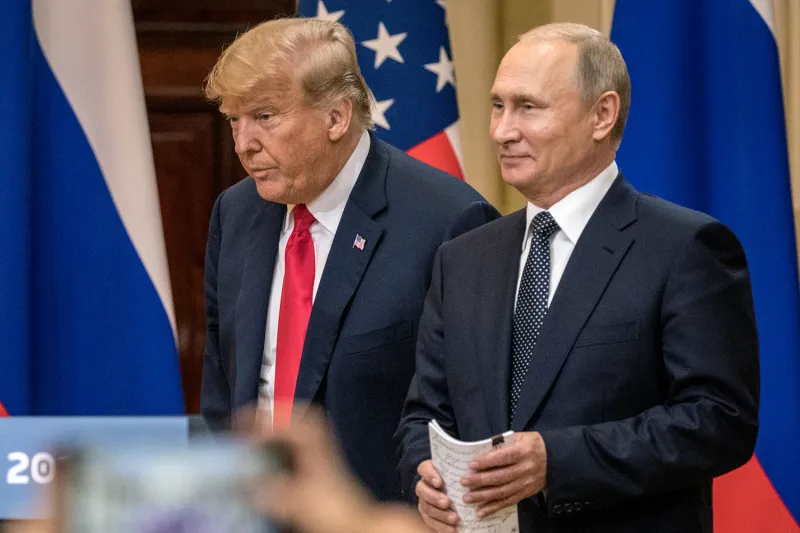WASHINGTON — President Donald Trump on Monday announced that Russia and Ukraine will begin immediate negotiations aimed at reaching a ceasefire and eventual peace agreement, following a phone call with Russian President Vladimir Putin. However, the Kremlin offered no specific timeframe, dampening hopes for a swift end to the more than three-year conflict.

In a post on his social media platform, Trump said he had conveyed the ceasefire proposal to Ukrainian President Volodymyr Zelenskyy and several European leaders, including the heads of France, Germany, Italy, Finland, and the European Union, in a group call following his conversation with Putin.
“Russia and Ukraine will immediately start negotiations toward a ceasefire and, more importantly, an END to the war,” Trump declared, later adding at the White House that he believed “some progress is being made.”
Putin, speaking after the call, acknowledged Trump’s support for renewed direct talks and confirmed Russia’s willingness to work with Ukraine on a memorandum outlining terms for a future peace accord. However, he stopped short of endorsing any immediate halt to hostilities.
“Efforts are generally on the right track,” Putin said, noting that while Russia is ready to resume negotiations, any agreement would take time.
Kremlin spokesperson Dmitry Peskov said the two leaders did not establish any deadlines for a ceasefire and warned of “complex contacts” ahead as Russia and Ukraine attempt to draft a unified proposal.
“There are no deadlines and there cannot be any,” Peskov told Russian state media. “Of course, everyone wants to do this quickly, but the devil is in the details.”
Trump’s announcement was met with cautious optimism in Europe, though several leaders moved forward with new sanctions against Russia. German Chancellor Friedrich Merz confirmed the decision in a late-night post on X (formerly Twitter), saying European leaders had agreed to expand pressure on the Kremlin.
But Trump declined to follow their lead, telling reporters that fresh U.S. sanctions might worsen the situation and could derail progress.
“I think there’s a chance of getting something done,” Trump said. “But there could be a time where that’s going to happen. This is not my war.”
Trump hinted at frustration with the negotiating parties, stating there were “some big egos involved” and warning he might “just back away” if talks failed to advance.
Following his conversation with Trump, Zelenskyy said Ukraine was open to direct negotiations with Russia in any format that leads to results. He suggested a high-level summit involving the U.S., EU, U.K., and Russia, possibly hosted by Turkey, the Vatican, or Switzerland.
Trump said Pope Leo had shown interest in hosting the talks at the Vatican, though the Holy See did not immediately confirm the report. The Kremlin welcomed the idea but said no final decision had been made.
While the announcement signals the first significant U.S.-backed diplomatic push in over a year, critics remain skeptical of Moscow’s intentions. Former Swedish Prime Minister Carl Bildt called the Kremlin’s maneuvering a “win for Putin,” saying the Russian leader was using the negotiations to delay pressure while continuing military operations.
“Putin deflected the call for an immediate ceasefire and instead continues military action while gaining leverage at the table,” Bildt said on X.
Putin has consistently refused to accept a 30-day ceasefire sought by Trump and Ukraine, demanding that Ukrainian forces withdraw from four regions Russia claims as its own before agreeing to any truce.
Last week, delegates from Ukraine and Russia met in Istanbul for the first time since 2022 at Trump’s urging. The meeting ended without a breakthrough after Putin rejected Zelenskyy’s offer for face-to-face talks.
Putin said the proposed memorandum would define key settlement principles, including timelines and conditions for a potential peace agreement.
“The main thing for us is to eliminate the root causes of this crisis,” Putin said. “We just need to determine the most effective ways to move towards peace.”
Despite Trump’s high-profile intervention, there remains no guarantee of an end to the war, which has killed tens of thousands, displaced millions, and reshaped European security. A senior source familiar with the group call said some European leaders were “shocked” by Trump’s refusal to confront Putin with sanctions.
European Commission President Ursula von der Leyen offered a restrained assessment, stating only that the conversation with Trump was “good” and affirming the importance of continued U.S. engagement.
While the Kremlin’s language hints at a willingness to negotiate, U.S. and Ukrainian officials remain wary that Moscow is buying time while seeking to solidify gains on the battlefield.
As the conflict grinds on, the world is watching to see whether Trump’s diplomacy will yield a lasting solution—or become another missed opportunity in a war with no clear end.
REUTERS



